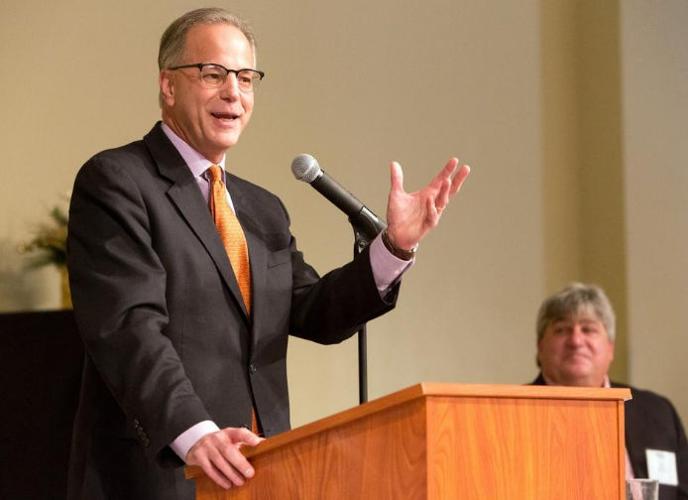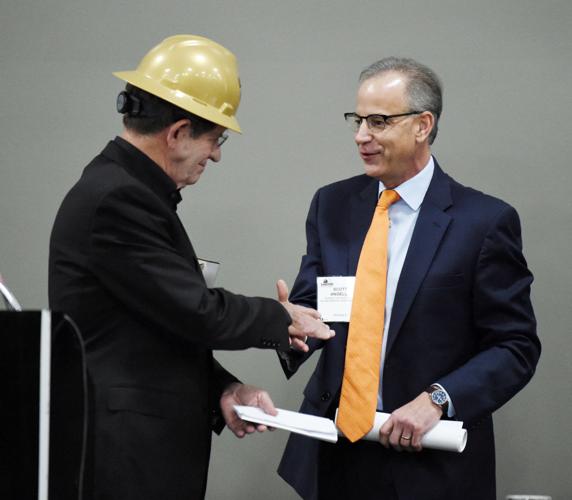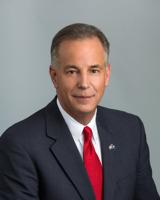Scott Angelle’s life cycles recently have become something akin to an oilfield worker, which kind of fits because he now regulates offshore drilling for the federal government.
“I see my family every 21 days,” Angelle said in an interview last week from Washington, D.C. “Since I have no family here, it’s all work for me, 14 hours a day.”
Consider Scott Angelle one of those up-and-comers who never quite up and came.
Once a ubiquitous presence on the Louisiana political scene, Angelle arrived in D.C. in May to become director of the Bureau of Safety and Environmental Enforcement. It’s a job historically held by an unknown bureaucrat with an office in the massive U.S. Department of Interior building, three blocks from the White House.
In the aftermath of the BP oil spill, Scott Angelle's experience in Washington as a leading voice against the federal deepwater drilling morat…
But President Donald Trump is pushing American “energy dominance” as a cornerstone of his presidency. This puts Angelle at the president’s shoulder for enabling domestic fossil fuels production.
In October, the Trump administration proposed opening nearly 77 million acres in the Gulf of Mexico — the largest offering in U.S. history — for oil and gas drilling. The lease sales are scheduled for March.
On Nov. 28, the Bureau of Safety and Environmental Enforcement approved energy exploration in the Arctic.
And just before the Christmas holiday, Angelle’s office suspended as duplicative a study meant to improve how regulators enforce safety on offshore rigs in the wake of the 2010 Deepwater Horizon explosion that killed 11 and spilled an estimated 3.2 million barrels of oil 40 miles off the coast of Louisiana.
All this activity has enraged environmentalists, but it falls in line with Angelle’s beliefs.
“This is a really, really impactful job for America, and it’s really important to Louisiana’s economy,” said Angelle, who previously oversaw oilfield activity in Louisiana as secretary of the Department of Natural Resources under two governors.
A federal agency that regulates offshore energy production in the Gulf of Mexico is focused on undoing or amending three Obama administration …
About 90 percent of the oil produced offshore in the U.S. comes from the Gulf of Mexico, he said, and all that activity creates thousands of jobs. (Gulf of Mexico production in federal waters accounts for about 17 percent of the nation's total energy output.)
“This is not our grandfather’s world,” Angelle said. Technological advances, such as fracking to release deposits from rocks and horizontal drilling, have increased U.S. production. The time of long lines for gasoline has passed, and a new era where America can supply the energy needs of other nations is on the horizon.
“We’ve gone from an era of scarcity to an era of abundance pretty quickly. We have to move from the 1980s goal of energy independence to the 2017 goal of energy dominance,” Angelle said.
To accomplish that goal, Angelle and the Trump administration want to provide access to more reserves offshore and to work with the industry.
In the office, Angelle spends his time reviewing royalties that energy producers have to pay the federal government with a goal, he said, of making the rates competitive with what other nations charge.
He’s also going over regulations to see what needs to stay, what needs to be streamlined and what needs to be eliminated. He said he wants safety inspections to be conducted more thoroughly by reviewing records on land and focusing on checking equipment and procedures on the offshore rigs.
Called on by Gov. Bobby Jindal in 2010 to serve as interim lieutenant governor, Angelle joined the Louisiana Public Service Commission in 2013.
He came within a hair of edging fellow Republican David Vitter out of a position in the 2015 gubernatorial runoff.
One of the great political conversations in Louisiana parlors is “What might have been” had Angelle won a spot in the runoff.
In the final debate before voters head to the polls Saturday to vote for governor, Republican Scott Angelle launched the most pointed attack y…
Though considered a shoo-in at the start of the race, Vitter carried baggage that his opponents wouldn’t discuss publicly until Angelle declared during a debate: “We have a stench that is getting ready to come over Louisiana, if we elect David Vitter as governor.”
John Bel Edwards went on to win and become the only Democratic governor in the Deep South. The Republican Party of Louisiana then considered whether to censure Angelle.
A member of the Louisiana Republican Party's governing committee is calling for the state GOP to censure Jay Dardenne and Scott Angelle becaus…
The following year, Angelle’s name appeared high on all the lists of likely candidates for the U.S. Senate seat being vacated by Vitter. He chose instead to seek the 3rd Congressional District seat that represents Acadiana.
As the odds-on favorite, Angelle led a field of a dozen candidates in a high-turnout November 2016 election. Then he was trounced a month later in the low-turnout runoff by Clay Higgins, a television cop known for trash talking suspects on Crime Stoppers segments that ran on local news and went viral on the internet.
In his first bid for public office, Clay Higgins — known as the Cajun John Wayne — defeated political veteran Scott Angelle on Saturday night …
Angelle joined the Trump administration in May.
Angelle said he has no regrets over what happened and harbors no plans to return to Louisiana politics.
Still, Washington has been a bit of culture shock, he said.
In Louisiana, he commuted from Breaux Bridge to Baton Rouge. Whenever he walked anywhere, it took time — shaking hands with this person, waving at that one, stopping to chat with a few others, casually placing a hand on the shoulders of some.
Washington is not that kind of town. Eye contact, touching, even casual conversation with strangers is seen as more threatening than endearing. Angelle said his 20-minute walk to work is brisk and if there’s any conversation, it’s on a cellphone.
Washington does have bars and pubs where expatriates can go to watch LSU and the Saints and talk about how much they miss home. Angelle doesn’t go.
“I’m not really a part of the community up here,” he said. “I’m just keeping my head down and doing this important job.”









